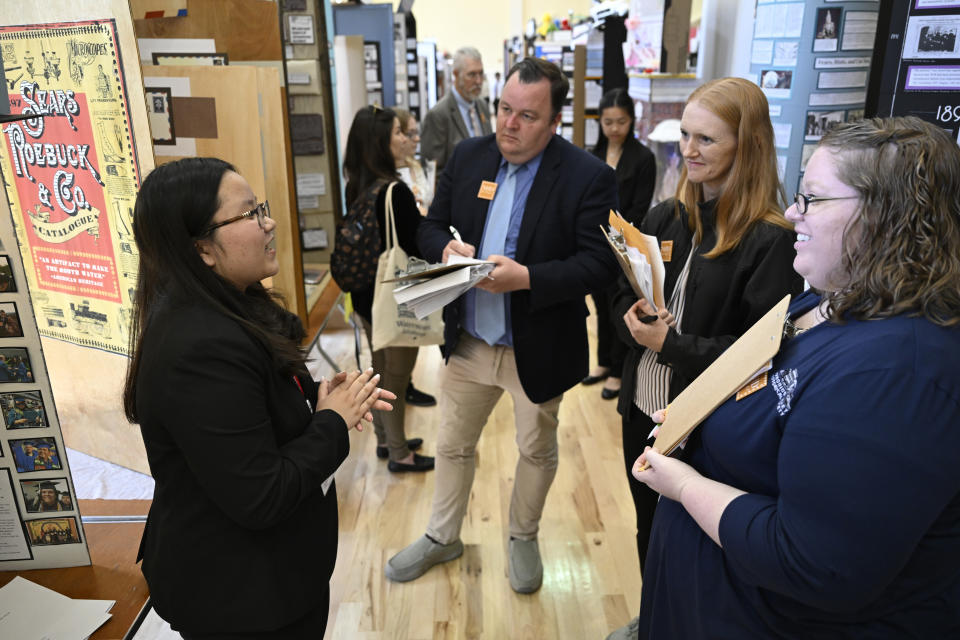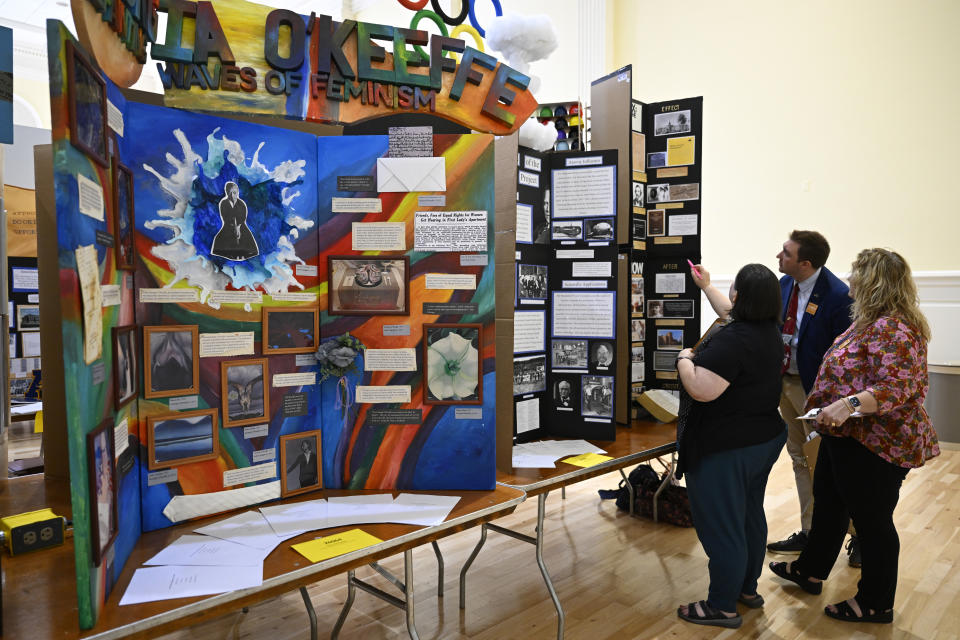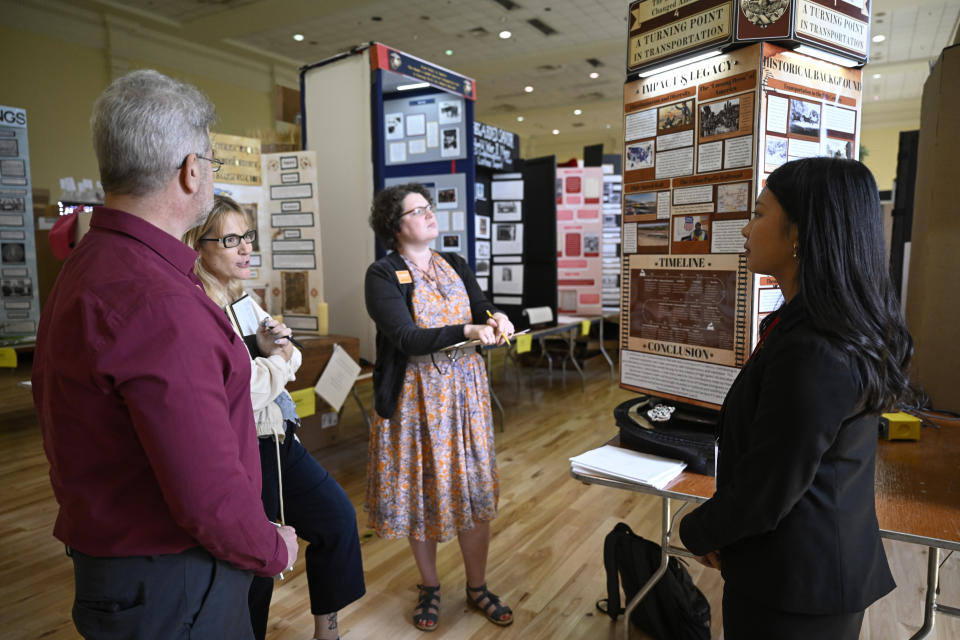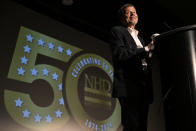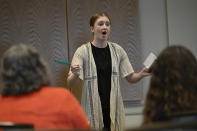At age 50, National History Day keeps pushing students to seek difficult truths through research
COLLEGE PARK, Md. (AP) — It wasn't your typical trifold poster board display. High school freshman Alexandra Bui constructed a jumbo mail-order catalog replica from wooden sheets — an inventive, oversized way to convey her research on the Sears catalog's impact on getting consumer goods to Black shoppers who faced in-store discrimination in the Jim Crow South.
Bui, of Temple, Texas, is one of half a million young scholars taking part in this year's National History Day, a Maryland-based nonprofit's annual campaign that encourages students to take ownership of their history educations and rigorously examine the past. As the 2024 edition marks 50 years of championing evidence-based argumentation, participants say they find the work more relevant than ever.
With students encountering toxic falsehoods online and some Republican-led states like Florida looking to limit historical analysis in the classroom, the competition wants to empower middle and high school students to dive deeper into topics of their own choosing.
“We can do our research. We can talk to experts. And we can figure out the truth,” Bui told The Associated Press.
This year’s theme of “Turning Points in History” asked students to explore ideas or events that sparked change. More than 2,800 finalists reached the national competition after months spent visiting libraries and poring over primary sources. Contestants lined University of Maryland hallways this week as they anxiously waited to present trifold exhibits, documentaries or even theatrical performances. They rehearsed lines or chatted with their peers, sometimes carrying props around campus and adjusting period-appropriate costumes. National winners will be announced Thursday, though all the students had already triumphed in several competitions just to get there.
National History Day was founded to invigorate history curricula beyond the “boring textbook” that students felt had “no meaning,” according to executive director Cathy Gorn. She cast the mission nowadays as one that strengthens democracy. A strong social studies education is an “antidote to conspiracy theories” and necessary for developing engaged citizens, she said.
Gorn finds the process especially effective today when many children want to understand the background for current events. The nonprofit does not “promote a particular agenda,” she emphasized, but instead guides students through their own inquiries. It equips teachers with classroom resources for navigating the Library of Congress, conducting oral histories and annotating bibliographies, among other skills.
“We are not telling the kids how to interpret the past or what to interpret of the past, but how to go about creating an interpretation and an argument based on the real research,” Gorn told AP.
“In learning that, they learn the importance of historical perspective," Gorn added. "And they learn, hopefully, to understand the past to be part of the future.”
National History Day also launched a $15 million capital campaign, though Gorn said it is difficult raise funds for history education.
The humanities have historically gone underfunded in K-12 public education. But there’s a growing recognition that high school graduates today must sort through a much more complex information environment than previous generations, according to David Knight, a professor of education finance and policy at the University of Washington. The education policy realm is beginning to understand the increased need, for example, to educate young people about the difference between primary and secondary evidence.
Judges said the projects jumpstart a lifelong pursuit of knowledge that serves all students regardless of their future endeavors. One of the most important lessons is to follow the “rabbit hole,” according to Robyn Gausman-Burnett, a University of Maryland geographical sciences doctoral student. She said National History Day trains students to never stop digging for “that next supporting piece of evidence," or “the other half of the story that isn't easily found on the Google search.”
“Nowadays on the internet, there’s a lot of false information," said Macy Huish, a high schooler from Logan, Utah. "So being able to pick out the little, golden nuggets is very important.”
“You might get resources that contradict with your thesis,” said Hannah Jang, a student at an international school in South Korea. “That’s also part of the process. You got to have the ability to accept it. And you can also study the reason behind it.”
Many students interviewed by AP said their projects were born out of personal experiences. Three middle schoolers who live near Alabama State University researched a nearly thirty yearslong federal court case that successfully challenged funding disparities between historically Black schools and predominantly white ones in their home state.
The legal battle is part of their history, they said, and they wanted to learn more about their history.
Acclaimed documentary filmmaker Ken Burns tasked finalists with defending American democracy. During a Q&A with students, Burns said they must “say no” to “authoritarians” who wish to revert the public “back into a superstitious peasantry.” Burns told AP that he felt optimistic to see so many students “questioning and diving deep into archives and not accepting the restrictions or the limitations.”
“We’re just trying to tell complicated stories about the United States,” he said. “It can only bode well in the age-old struggle between those who want to limit these things and those of us who think that we are liberated by the truth.”
___
Associated Press coverage of philanthropy and nonprofits receives support through the AP’s collaboration with The Conversation US, with funding from Lilly Endowment Inc. The AP is solely responsible for this content. For all of AP’s philanthropy coverage, visit https://apnews.com/hub/philanthropy.

 Yahoo Finance
Yahoo Finance 